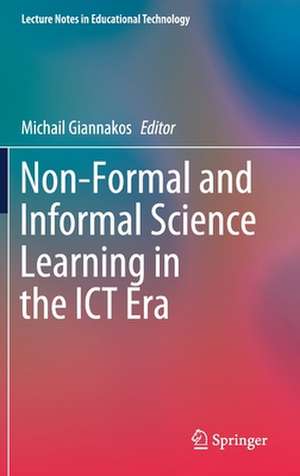Non-Formal and Informal Science Learning in the ICT Era: Lecture Notes in Educational Technology
Editat de Michail Giannakosen Limba Engleză Hardback – 15 sep 2020
| Toate formatele și edițiile | Preț | Express |
|---|---|---|
| Paperback (1) | 939.62 lei 6-8 săpt. | |
| Springer Nature Singapore – 16 sep 2021 | 939.62 lei 6-8 săpt. | |
| Hardback (1) | 945.62 lei 6-8 săpt. | |
| Springer Nature Singapore – 15 sep 2020 | 945.62 lei 6-8 săpt. |
Din seria Lecture Notes in Educational Technology
-
 Preț: 349.91 lei
Preț: 349.91 lei -
 Preț: 359.76 lei
Preț: 359.76 lei -
 Preț: 397.97 lei
Preț: 397.97 lei - 18%
 Preț: 898.43 lei
Preț: 898.43 lei - 20%
 Preț: 1006.07 lei
Preț: 1006.07 lei - 20%
 Preț: 820.60 lei
Preț: 820.60 lei - 15%
 Preț: 647.27 lei
Preț: 647.27 lei - 15%
 Preț: 699.45 lei
Preț: 699.45 lei - 15%
 Preț: 633.31 lei
Preț: 633.31 lei - 20%
 Preț: 597.45 lei
Preț: 597.45 lei - 20%
 Preț: 580.53 lei
Preț: 580.53 lei - 15%
 Preț: 702.16 lei
Preț: 702.16 lei - 15%
 Preț: 644.82 lei
Preț: 644.82 lei - 15%
 Preț: 650.69 lei
Preț: 650.69 lei - 24%
 Preț: 804.33 lei
Preț: 804.33 lei - 18%
 Preț: 1003.38 lei
Preț: 1003.38 lei - 15%
 Preț: 647.08 lei
Preț: 647.08 lei - 18%
 Preț: 947.85 lei
Preț: 947.85 lei - 15%
 Preț: 643.48 lei
Preț: 643.48 lei - 18%
 Preț: 999.45 lei
Preț: 999.45 lei - 18%
 Preț: 1102.03 lei
Preț: 1102.03 lei - 18%
 Preț: 891.80 lei
Preț: 891.80 lei - 18%
 Preț: 1002.94 lei
Preț: 1002.94 lei -
 Preț: 393.90 lei
Preț: 393.90 lei - 18%
 Preț: 790.77 lei
Preț: 790.77 lei - 18%
 Preț: 946.41 lei
Preț: 946.41 lei - 18%
 Preț: 784.92 lei
Preț: 784.92 lei - 15%
 Preț: 643.99 lei
Preț: 643.99 lei - 15%
 Preț: 643.00 lei
Preț: 643.00 lei - 15%
 Preț: 644.63 lei
Preț: 644.63 lei - 24%
 Preț: 818.24 lei
Preț: 818.24 lei - 18%
 Preț: 902.36 lei
Preț: 902.36 lei - 18%
 Preț: 952.72 lei
Preț: 952.72 lei - 18%
 Preț: 942.44 lei
Preț: 942.44 lei -
 Preț: 387.96 lei
Preț: 387.96 lei - 18%
 Preț: 1001.50 lei
Preț: 1001.50 lei - 15%
 Preț: 647.59 lei
Preț: 647.59 lei - 15%
 Preț: 642.83 lei
Preț: 642.83 lei
Preț: 945.62 lei
Preț vechi: 1153.19 lei
-18% Nou
Puncte Express: 1418
Preț estimativ în valută:
180.94€ • 188.93$ • 149.42£
180.94€ • 188.93$ • 149.42£
Carte tipărită la comandă
Livrare economică 15-29 aprilie
Preluare comenzi: 021 569.72.76
Specificații
ISBN-13: 9789811567469
ISBN-10: 9811567468
Pagini: 186
Ilustrații: VI, 186 p. 19 illus., 12 illus. in color.
Dimensiuni: 155 x 235 mm
Greutate: 0.45 kg
Ediția:1st ed. 2020
Editura: Springer Nature Singapore
Colecția Springer
Seria Lecture Notes in Educational Technology
Locul publicării:Singapore, Singapore
ISBN-10: 9811567468
Pagini: 186
Ilustrații: VI, 186 p. 19 illus., 12 illus. in color.
Dimensiuni: 155 x 235 mm
Greutate: 0.45 kg
Ediția:1st ed. 2020
Editura: Springer Nature Singapore
Colecția Springer
Seria Lecture Notes in Educational Technology
Locul publicării:Singapore, Singapore
Cuprins
1. Introduction to Non-Formal and Informal Science Learning in the 21st Century.- Section in Games and Making.- 2. Playing Digital Games as a Mean to Enhance Science Learning.- 3. Thinkpetizers: Creative Thinking for Science Learning.- 4. SkillsDojo: Interactive Missions to Introduce Children to 21st Century Skills.- Section in Coding and Robotics.- 5. Integrating Creative Design, Innovation and Criticality into Programming Education.- 6. Open Online Courses for Informal Teaching and Learning Coding.- 7. Technology-Enhanced Constructionist Approach for Learning Science.- 8. Robotics to Enhance STEM Education.- Section in Innovations in Fairs and Creative Spaces.- 9. Opportunities and Practices for Learning Science in Everyday Life.- 10. Innovations in Maker Spaces for Young Scientists.- 11. Synthesis/Summary.
Notă biografică
Michail Giannakos is Professor of Interaction Design and Learning Technologies at the Department of Computer Science, Norwegian University of Science and Technology (NTNU), and Head of the Learner-Computer Interaction Lab. His research focuses on the design and study of emerging technologies in online and hybrid education settings, and their connections to student and instructor experiences and practices. Giannakos has co-authored more than 150 articles published in peer-reviewed journals and conferences, including Computers & Education, Computers in Human Behavior, Behaviour & Information Technology to mention few, and has served as an evaluator for the EC and the US-NSF. He has served/serves in various organization committees, program committees as well as editor and guest editor on highly recognized journals. He has worked at several research projects funded by diverse sources like the EC, Microsoft Research, The Research Council of Norway, US-NSF, the German agency for International Academic Cooperation (DAAD) and Cheng Endowment; Giannakos is also a recipient of a Marie Curie/ERCIM fellowship, the Norwegian Young Research Talent award and he is one of the outstanding academic fellows of NTNU (2017-2021).
Textul de pe ultima copertă
This book introduces the reader to evidence-based non-formal and informal science learning considerations (including technological and pedagogical innovations) that have emerged in and empowered the information and communications technology (ICT) era. The contributions come from diverse countries and contexts (such as hackerspaces, museums, makerspaces, after-school activities) to support a wide range of educators, practitioners, and researchers (such as K-12 teachers, learning scientists, museum curators, librarians, parents, hobbyists). The documented considerations, lessons learned, and concepts have been extracted using diverse methods, ranging from experience reports and conceptual methods to quantitative studies and field observation using qualitative methods. This volume attempts to support the preparation, set-up, implementation, but also evaluation of informal learning activities to enhance science education.
Caracteristici
Shares a range of informal learning activities to enhance STEM education Presents evidence-based best practices for informal science learning Employs 21st-century technologies to advance the STEM educational agenda
